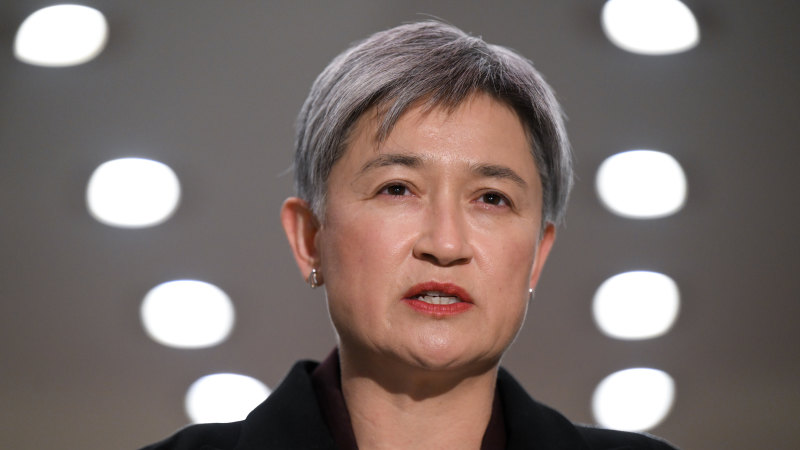Save articles for later
Add articles to your saved list and come back to them any time.
London: The Coalition has accused Labor of inaction over China’s human rights abuses, questioning why the government has failed to introduce the sanctions and travel bans adopted by other jurisdictions such as the United Kingdom, United States and European Union.
The criticisms were echoed by Human Rights Watch, which queried what message Australia was sending by not joining other comparable countries in taking action.
Foreign Affairs Minister Penny Wong has been criticised by the Opposition and human rights groups.Credit: AAP
The opposition’s foreign affairs spokesman, Simon Birmingham, launched the attack on the anniversary of the finding made by the UN’s High Commissioner for Human Rights, who said China’s forced detention and treatment of Uyghurs “may constitute international crimes, in particular crimes against humanity”.
Last October, China rallied its allies at the Human Rights Council to block a debate on the finding.
But individual countries have subsequently introduced sanctions and targeted travel bans against Chinese officials believed responsible for the systemic abuse of Uyghurs, which the UK’s House of Commons has declared is genocide.
Senator Birmingham said that Foreign Affairs Minister Penny Wong had not responded to his offer to participate in a bipartisan statement of support of sanctions.
“Disappointingly, there has been little action from the Albanese government in response to this report. Despite repeated calls from the Uyghur community in Australia and offers of bipartisanship from the Coalition, Labor has chosen not to utilise the responses available to them,” Birmingham said.
“The Albanese government’s inaction stands in contrast to the actions taken by the European Union, UK, US and Canada, who have pursued those responsible with targeted sanctions, including travel bans and asset freezes.”
He urged Wong to accept the Coalition’s offer of bipartisan support to introduce sanctions “without further delay” and “send a strong message that Australia is serious about these human rights violations”.
Daniela Gavshon, director of Human Rights Watch Australia, queried what message the government was trying to send with its inaction.
“Twelve months on from the release of the High Commissioner’s damning report on Xinjiang, the Australian government should join other democracies in holding serious human rights abusers in China to account. By not doing this, what message is Australia sending?” Gavshon said.
“In recent days China’s President Xi Jinping has made clear his intent to continue widespread, systematic abuses.
“It is up to the Albanese government to demonstrate, through tools like sanctions, that this conduct cannot be tolerated and abusers will be made accountable.”
Australia’s law to punish human rights abusers, the Magnitsky Act, named after the murdered Russian tax accountant Sergei Magnitsky, was introduced in December 2021 and first used against Russians in March 2022.
The law has been used against Myanmar, but never against China.
Since coming to government, Prime Minister Anthony Albanese has said he wanted to stabilise Australia’s relationship with China, which reached a nadir under the former government when former prime minister Scott Morrison called for an inquiry into the origins of COVID-19.
Wong’s spokeswoman said the UN’s findings were harrowing and the minister acknowledged the “pain and distress” in the Australian Uyghur community.
“The resumption of dialogue with China has enabled Australia to raise our deep concerns about the situation in Xinjiang at the highest levels,” the spokeswoman said.
“We will continue to press China bilaterally and advocate in multilateral institutions for transparency and accountability.”
Get a note directly from our foreign correspondents on what’s making headlines around the world. Sign up for the weekly What in the World newsletter here.
Most Viewed in World
From our partners
Source: Read Full Article



